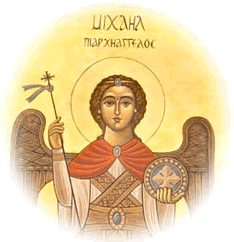| |

 The Holy Archangel Michael is one of the most celebrated
of the Angels and bodiless powers; he is called the Archistrategos, or
chief commander, of all the bodiless powers. According to Holy
Scripture and Tradition, he has interceded for humanity multiple times
and continues to serve as the Defender of the Faith. St Michael is most
often invoked for protection from invasion by enemies and from civil
war, and for the defeat of adversaries on the field of battle. He is
celebrated primarily on November 8, the Synaxis of Michael and all the
Bodiless Powers of Heaven; September 6 also marks the miracle of the
Archangel at Colossae. The Holy Archangel Michael is one of the most celebrated
of the Angels and bodiless powers; he is called the Archistrategos, or
chief commander, of all the bodiless powers. According to Holy
Scripture and Tradition, he has interceded for humanity multiple times
and continues to serve as the Defender of the Faith. St Michael is most
often invoked for protection from invasion by enemies and from civil
war, and for the defeat of adversaries on the field of battle. He is
celebrated primarily on November 8, the Synaxis of Michael and all the
Bodiless Powers of Heaven; September 6 also marks the miracle of the
Archangel at Colossae.
The name Michael means "like unto God" or "Who is like unto God?"
Michael first appears in the Old Testament in the book of Joshua's
account of the fall of Jericho. Though Michael is not mentioned by name
in the text, it is said that Joshua "looked up and saw a man standing
in front of him with a drawn sword in his hand." When the still unaware
Joshua asks which side of the fight the Archangel is on, Michael
responds, "neither...but as commander of the army of the Lord I have
now come" (Joshua 5:13-14)1.
In the book of Daniel, Michael appears first to help the Archangel
Gabriel defeat the Persians (10:13). In a later vision it is revealed
to Daniel that "at that time [the end times] Michael, the great prince
who protects your people, will arise. There will be a time of distress
such as has not happened from the beginning of nations until then..."
(Ch. 12)1. Michael thus plays an important role as the protector of
Israel and later of his chosen people, the Church.
The Church Fathers also ascribe to Michael the following events: During
the Exodus of the Israelites from Egypt he went before them in the form
of a pillar of cloud by day and a pillar of fire by night; the power of
the great Chief Commander of God was manifest in the annihilation of
the 185 thousand soldiers of the Assyrian emperor Sennacherib (4/2
Kings 19:35); also in the smiting of the impious leader Heliodorus (2
Macc. 3: 24-26); and in the protection of the Three Holy Youths:
Ananias, Azarias and Misail, thrown into the fiery furnace for their
refusal to worship an idol (Dan 3:22-25). Through the will of God, the
Chief Commander Michael transported the Prophet Habbakuk (December 2)
from Judea to Babylon, to give food to Daniel in the lions' den (Dan.
14:33-37). The Archangel Michael disputed with the devil over the body
of the holy Prophet Moses (Jude 1:9).
In New Testament times, the holy Archangel Michael showed his power
when he miraculously saved a young man, cast into the sea by robbers
with a stone about his neck on the shores of Mt Athos. This story is
found in the Athonite Paterikon, and in the Life of St Neophytus of
Docheiariou (November 9).
Perhaps his most famous miracle, though, is the salvation of the church
at Colossae. Here a number of pagans tried to destroy this church by
diverting the flow of two rivers directly into its path. However, the
Archangel appeared amongst the waters, and, carrying a cross, channeled
the rivers underground so that the ground the church stood on would not
be destroyed. The spring which came forth after this event is said to
have special healing powers.
Michael also has been associated with healing in other cases, as well
as his primary role as leader of the Church Militant. He has been said
to appear to Emperor Constantine the Great (d. 337) at Constantinople,
to have intervened in assorted battles, and appeared, sword in hand,
over the mausoleum of Hadrian, in apparent answer to the prayers of
Pope St. Gregory I the Great (r. 590-604) that a plague in Rome should
cease.
Russians in particular have a special veneration to Michael, along with
the Theotokos. According to OCA, "Intercession for Russian cities by
the Most Holy Queen of Heaven always involved Her appearances with the
Heavenly Hosts, under the leadership of the Archangel Michael. Grateful
Rus acclaimed the Most Pure Mother of God and the Archangel Michael in
church hymns. Many monasteries, cathedrals, court and merchant churches
are dedicated to the Chief Commander Michael. In Rus there was not a
city where there was not a church or chapel dedicated to the Archangel
Michael."
Source: http://orthodoxwiki.org/Archangel_Michael
|
|















